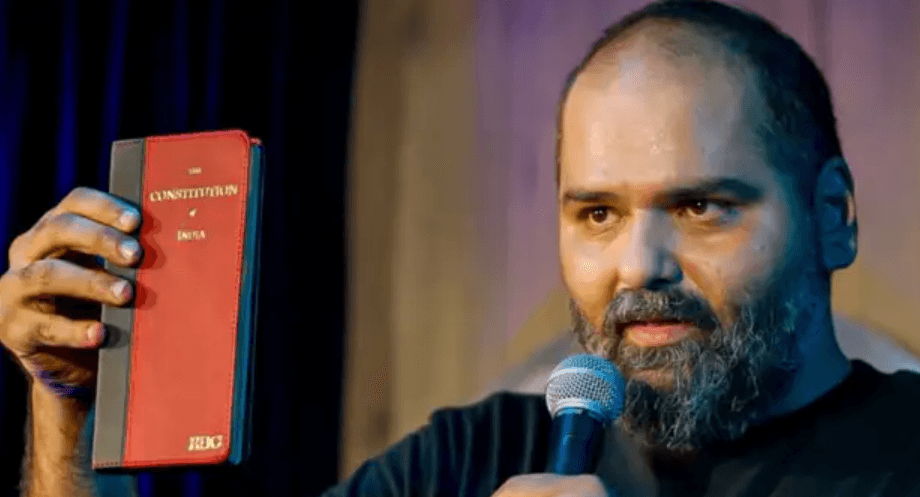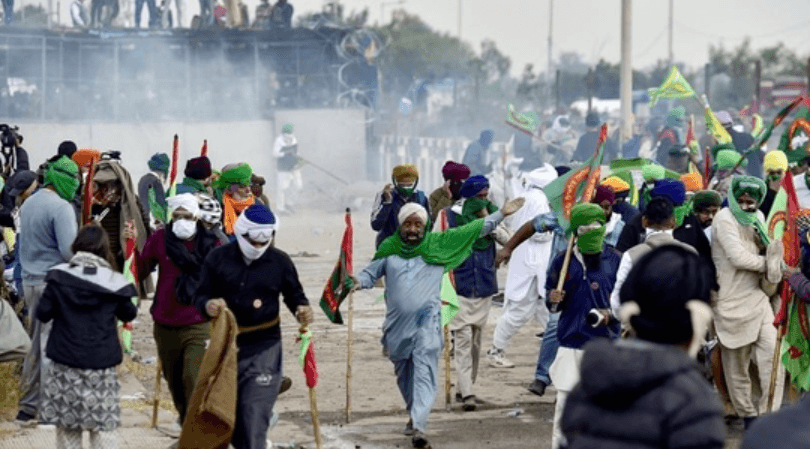When internal contradictions in capitalism begin to contribute to its downfall, fascism emerges as a political form to save it. Often in times of economic recession, when capitalism starts failing to guarantee jobs, fair wages, or welfare, big corporations and industrial elites start backing fascist forces that promise “national revival” and “order.” Hence, these two systems can be observed supporting one another’s survival and facilitating each other’s growth at various points.
Now, the people are left with no choice but to confront the harsh reality behind the promises made by fascist leaders, who are backed by capitalists. These leaders offer a perilous game that exploits social identities like religion, caste, ethnicity, and race to create a shared enemy and assign blame for all economic failures.
These fabricated enemies are used to distract the majority while the state quietly erodes workers’ rights, outlaws unions, and suppresses dissent in order to safeguard capitalist profits, even in times of economic crisis. In return, capitalists not only shield and promote these fascist forces but also often play an active role in their rise by funding them and shaping their narratives. And in this way, fascist capitalists, together, continue to create the illusion of change for the people while pursuing their own goals.
Silencing the margins: Media capture, wealth inequality, and fascist capitalism
The current state of our country clearly demonstrates how capitalism and fascism reinforce each other. As wealth becomes increasingly concentrated in the hands of a few, the economic divide is deepening at a pace not seen in over a century. In 2023, the richest 1 per cent owned 39.5 per cent of India’s national wealth, while the poorest 50 per cent held only 6.5 per cent; this disparity is greater than during colonial rule.
This economic injustice is accompanied by a rapid erosion of democratic freedoms. Major Hindi media houses have become agents of spreading the government’s propaganda and abandoned journalism in favour of acting as a tool of government. Voices of independent journalists are being silenced. Recently journalist Rupesh Singh completed 1,000 days in jail, and a Bastar-based journalist, Mukesh Chandrakar, was killed. These journalists got punishment for doing their job honestly. According to the World Press Freedom Index, India ranks 159th out of 180 countries in 2024.
The suppression of dissent extends far beyond journalism. Communal violence rose 84 per cent in the country during 2024 as per the report by the Centre for Study of Society and Secularism (CSSS). Student activists remain imprisoned, and the farmers’ protest continues to be ignored even after five years.
The nexus between corporate and state
Corporate organisations align themselves with the state, actively discrediting dissenters and intentionally contributing to polarisation. Under the cover of nationalism, they protect their interests. The state and capital are operating together as a censorship machine, legitimising superstition, criminalising criticism, and allowing only voices that serve power to be heard.

Recently, comedian Kunal Kamra’s show Naya Bharat faced police complaints and vandalism by members of the Yuva Sena. His performances were removed by BookmyShow, an online platform which provides tickets under political pressure; this compelled Kamra to make a public appeal to BookMyShow, requesting either the reinstatement of his listings or access to his audience’s contact information.
However, BookMyShow responded to Kunal Kamra’s claims by clarifying that its role is limited to being a neutral ticketing platform, operating in compliance with Indian laws. The company stated that the decision to list or delist shows lies solely with the event organisers or venues, not BookMyShow.
It is not surprising that capitalist organisations often follow the lead of fascist governments. In fact, this has become the new reality to punish dissent and reward conformity.
Another incident related to Kunal Kamra took place five years ago, when he was banned by almost all leading airlines; this sheds light on the troubling intersection between capitalism and state apparatus. He allegedly heckled journalist Arnab Goswami on an Indigo flight, which led to his subsequent bans by Indigo, Air India, SpiceJet etc. The question is, even if Kamra’s behaviour was inappropriate, it was only IndiGo that was directly involved and had the right to take action. So why did other airlines, who weren’t part of the incident at all, feel the need to ban him as well? What explains this sweeping response to a situation that didn’t even concern them?
The widespread bans reveal a deeper reality of state- and corporate-aligned action to maintain control by discouraging challenges to state-approved narratives or figures like Goswami.
In 2023, the government ordered social media platforms to block a BBC documentary about the 2002 Gujarat riots. During the Ram Mandir celebrations, Reliance Industries, led by Mukesh Ambani, didn’t just make generous donations or join in the festivities — the company went a step further by declaring a nationwide holiday on January 22, allowing all its offices across India to shut down in honour of the Pran Pratishtha ceremony in Ayodhya.
Policing the palate: Dietary nationalism and cultural erasure
In November 2023, the Maharashtra government announced its decision to include eggs in the mid-day meal scheme for non-vegetarian students but this scheme was met with strong opposition from right-wing groups. These groups, including BJP and Shiv Sena’s spiritual cells, argued that serving eggs hurt religious sentiments.
In the beginning of this year the Maharashtra government framed its reversal in the name of not having sufficient funds, but this decision enlisted Maharashtra into many BJP-led states where eggs are not served in midday meals. Only three BJP ruling states serve eggs in midday meals; it reflects a broader effort to promote vegetarianism by imposing cultural and dietary norms through policy, disregarding the diverse food practices of the population despite the fact that eggs are a cheap source of protein and the children coming to government schools and depending on midday meals need it highly.
In Delhi’s CR Park, a Bengali-majority area, fish sellers reported being pressured by saffron-clad individuals to shut their shops during Navratri this year. Residents condemned this as an attack on their food culture, noting that fish is not only a staple but also holds religious and cultural value, seen as pure and auspicious and even offered as prasad in Bengali traditions.
In an attempt to align with the state’s narrative, Anant Ambani, during his padyatra, “rescued” hens from a market, asking his team to buy and free them. It is ironic that on the one hand, Anant Ambani was saving hens, whereas JioMart, under the Ambani banner, continues to sell fresh chicken.
The illusion of neutrality and manufactured consent in a fascist state
Television news channels have increasingly functioned as extensions of the ruling party’s publicity machinery. During elections, they were saturated with BJP advertisements, prominently featuring Modi, while opposition leaders received minimal coverage. Critical issues raised by non-BJP parties were ignored or downplayed, as the focus remained fixed on amplifying government narratives.

For instance, debates in Parliament around the Constitution were swiftly abandoned by Hindi news channels to cover the “discovery” of a Hanuman temple in Sambhal, an event framed as a major revelation. Simultaneously, channels like India TV ran sensational reports about alleged electricity thefts by Muslims, while Sudarshan News went further, airing inflammatory segments such as “Jihad News” and falsely linking a Hindu teenager’s suicide to Muslim harassment, revealing how communal narratives are actively shaped to support the government’s political agenda.
On February 13, 2024, farmers’ protests reignited due to unfulfilled promises as a result of unfulfilled demands. As the ‘Dilli Chalo,’ march gained momentum, numerous social media accounts of farmers, journalists, Dalit activists, and local organisations from Punjab and Haryana were blocked. Accounts like Tractor to Twitter, Gaon Savera, and those of Mandeep Punia and Hansraj Meena were also abruptly taken down.
Farm leader Gurpreet Sangha’s accounts stated, “First, Ramandeep Mann’s account was blocked on 12 February, then Tejveer Singh, then mine, then Mandeep Punia and then a DU Jat union’s account too. Then the number kept on increasing. There are over 200 accounts that have been blocked so far.”
The role of the media is critically evaluated here because it no longer functions as an independent pillar of democracy. Major news outlets are owned by powerful corporate houses like Reliance, which controls Network18, and Adani, which owns NDTV. These large companies have a strong connection with the government and rely on government policies that favour them in order to increase their wealth. Consequently, the media has become a tool of political and corporate power. It echoes state propaganda, suppresses dissent, and distracts from real issues.





